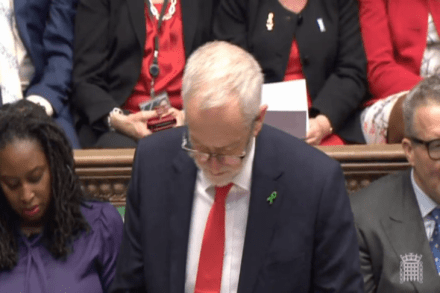Are the late nights flogging Labour Live tickets getting to Corbyn?
Odd sights at PMQs today. Theresa May wore a dark blue outfit covered in an outbreak of Pollock-esque dots, as if she’d just arrived from a paintballing contest. Jeremy Corbyn looked angry, knackered and distressed. His scarlet tie was all askew and his eyes appeared shadowed and hollow. Why so fatigued? Yesterday he was in Brighton, he told us, addressing the Fire Brigades Union, ‘who work hard to keep us all safe.’ (Strike-days excluded). It’s rumoured that Corbyn has been up late at night flogging seats for Labour Live, the party’s summer rally on June 16. He’s the headline act. Tickets are £35. A discount of a fiver is available




















